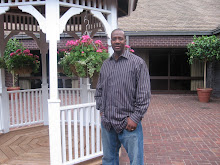Thursday, April 15, 2010
On Marriage & Morals
Which is more morally reprehensible: Open Marriage or Gay Marriage? I believe strongly that marriage is between one man and one woman, so by definition, I would be vastly opposed to both of the aforementioned. As a heterosexual, it is not surprising that I have a major problem with gay marriage. (No offense to my lone gay friend, but she knows I still love her).
I certainly believe that gays and lesbians should have the same rights afforded to them under the Constitution as heterosexuals; just not marriage. Maybe it's my strongly-held religious beliefs, maybe it's that I'm NOT as liberal as I vote, maybe it's my own sexual orientation, but I just feel that if gay marriage becomes the law of the land across the United States, then what next? Legalizing polygamy? Or allowing a man and a horse to get married? At some point, there has to be some principles for which we hold sacred about the sanctity of marriage, and at the very least a guiding principle of marriage is that it is between a man and a woman.
When I hear the gay and lesbian movement liken their plight to the plight of blacks fighting for civil rights in the 1950's and 60's they lose my sympathy. To me, there's no comparison. Do I favor civil unions for gays? Sure. Should these civil unions be written in such a way as to include the same benefits that married couples enjoy? Absolutely. But that is as far as I can go with the whole gay marriage debate.
Now to the idea of open marriage. Critics of open marriage say that it is a pact entered into unwillingly by women. Most women simply agree to it to please their man, they argue. There may be some truth to this, especially if a couple has been married for awhile and then the man springs up the ‘open marriage idea’.
Some women might go along with an open marriage to ‘get along’, but only as an alternative to being with a man that they figure will leave or cheat anyway if they don’t. They might say to themselves, “I’d rather be in an open marriage, than gamble on trying to find a man that will be faithful and wind up getting hurt.” Some of these women may purposely remain single into their 30’s because of skepticism of love and committed relationships. They have seen their girlfriends give their all to men, only to be devastated with the revelation of an affair. Some have even seen their own mother hurt and abandoned by their father; and then witnessed their mother in a revolving door of bad relationships with men that were unfaithful.
However, using this assumption is also assuming that most women aren’t assertive about what THEY want, need, and expect in a marriage. I just don’t believe that most women will voluntarily acquiesce to something as serious as being in an open marriage. Open marriage is still relatively rare, but my assumption is that more and more women that are in open marriages consent because they are as adventurous and enjoy variety as much as the men. It’s also possible that women in open marriages have problems with commitment or monogamy like their husbands.
Now the question is: Are either one of these deviant forms of marriage likely to end in “happily ever after”, or are the divorce rates for these couples as high as traditional married couples?
Subscribe to:
Post Comments (Atom)

I think the key point in both issues is that "marriage" is a legal and practical definition more so than a relgious one. People remain married (living together or apart) because their finances are so intertwined with their partner that to dissolve that marriage is to dissolve fiscal ties. I think gay "marriage" works within that definition [just like going into business with a friend]. It seems, though, that open marriage is more of a financial contract that has loopholes for outside emotional or physical partners who have no monetary stake in the partnership. The biggest problem with all kinds of marriages though is that some people, once married, forget that they aren't married to a bank or business, but to a person. Many marriages break up because of lack of self knowledge (trying to be something for someone else)and selfishness (only focuses on individual). What should be the basis for any relationship--not specific to any one religion--is honoring one another as spirit beings with respect.
ReplyDeleteAlexis
Very true. However, as you said, people in a marriage aren’t married to “a bank or business, but to a person”, so it’s hard for me to examine “marriage” strictly from a “legal or practical” definition, especially for the subjects of this column. Gay marriage and open marriage, because of the Judea-Christian values that America portends to espouse are both moral issues. Both elicit strong [negative] reactions from not only the so-called “religious right” in this country, but even many Agnostics, and/or liberals. That was my focus in this particular blog entry.
ReplyDelete